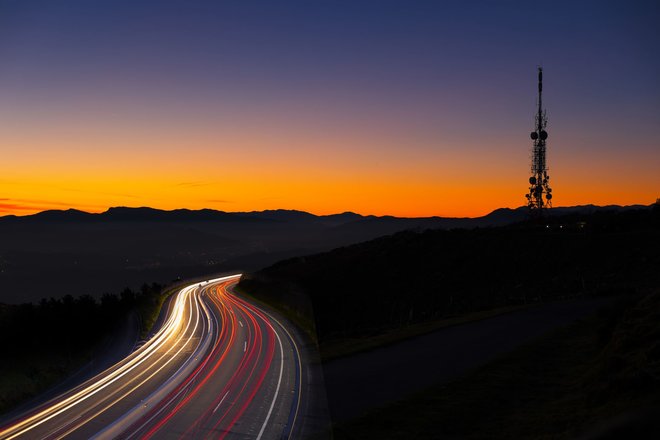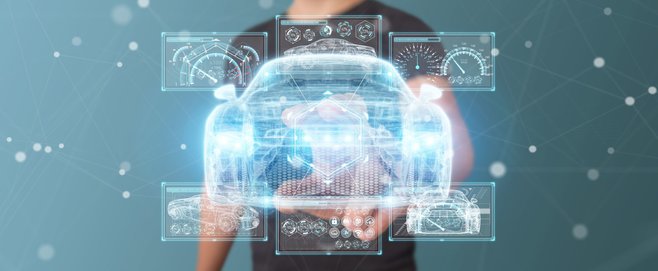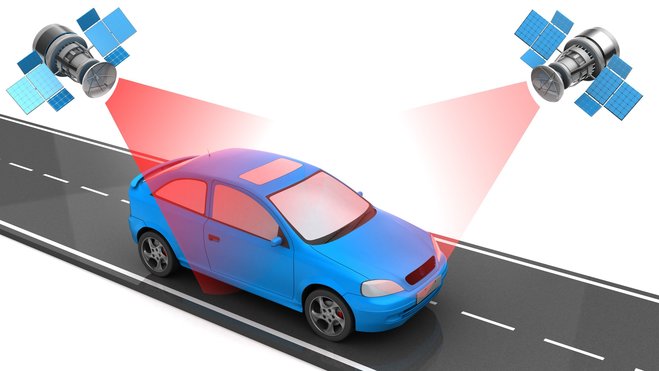Some news set the Internet ablaze with intractable fronts facing off. When recently the news broke that, as of now, all newly released European cars would have to include the "eCall" emergency system, that was one of those days. While some saw clear signs of an imminent Orwellian future as depicted in "1984", others made a case for faster help and fewer accident victims. And while we're still debating, Dubai has abandoned data privacy altogether. But where does expediency end and mass surveillance begin? Will future cars be traceable with pin-point accuracy in mere seconds?

There's no debating that every accident victim poses a tragedy. Apart from better braking systems, electronic stability programs and driver-assistance systems, a new safety component is now emerging: networking. The EU recently laid the groundwork for just that. In-vehicle emergency call systems that are already becoming a standard for current BMW models are now mandatory for all future cars. The systems detect crashes and notify emergency call centers automatically. Depending on the model, they can even send out data about passenger number and circumstances surrounding the accident (car body integrity, compression forces etc.). Emergency call centers will then try to contact the drivers.
If a driver doesn't respond, the exact location of their car will be determined via GPS and emergency responders dispatched. Experts believe this could save between 1500 and 2500 lives every year - an impressive figure. Critics say every car will henceforth be bugged, a thought that makes for a frightening scenario not just in the eyes of privacy groups and free thinkers. In theory, the microphones could be activated at any time to enable eaves dropping operations - after all, the technology is there. Exact movement profiles for individual cars would pose little challenge. Naturally, there is already an EU regulation against this practice that was passed way back in 2015. Permanent vehicle tracking is prohibited and data streams sent in the event of an emergency can only include essential information. Sounds reassuring but a healthy dose of skepticism remains. Will states and intelligence agencies really abstain from (ab)using such a powerful surveillance tool? I have my doubts!
 Already a reality in Dubai: real-time car data sharing
Already a reality in Dubai: real-time car data sharing
Then again, Dubai elevated this issue to a different plane entirely. They are currently field-testing "smart" license plates - and these pack a punch! Crammed with technology, emergency calls are supported but that's just a fraction of the impressive feature set. Dubai's license plates are constantly phoning home to traffic authorities providing permanent feedback on the traffic situation. And since plates are directly linked to car owners, it'll be a golden opportunity for data collectors with fines and penalties all stored in the same data set. Whether cars have already been in an accident will also be perfectly transparent.
If this is what the first generation of smart license plates can do, imagine what's in store for them (and us) next. With enough computing power, all drivers could be analyzed in real time. Who's speeding? Who's parking illegally? Who fled the scene of an accident? It would make life so much easier! If you were going too fast in a 70 mile zone, you'd instantly be tracked and the required fine deducted from your bank account. Maybe governments would even be gracious enough to send you a stern mail prompting you to be a more responsible citizen in the future. I'm quite positive this would lead to fewer traffic violations and accidents - but at what cost?

I'd rather not be a traceable dot on a computer screen every time I go for a drive. Not because I'm a bad driver (I've had my license since 1992, no tickets, no traffic violation points) but because where I'm going is nobody's business but mine! Innocent until proven guilty still applies and, as a good citizen, I refuse to be under permanent surveillance, it's that simple. Besides, one thing is already painfully apparent: as soon as the technology becomes a standard, it'll be hacked, manipulated and misused. Still, let's not forget the motivation behind it: to lower the number of traffic victims and to enable responders to be on the scene faster. Outright condemning the technology might be too simple a response to a complex issue.
Here's a poser for you: should we take the path of better safety even if it could lead to more surveillance?




As a former EMT, I can appreciate the concept of enormous amounts of data being available instantly at the time of an accident. As a free citizen of a free country, I really don't like the concept of having my whereabouts and driving monitored 24/7. As for the automatic deduction of speeding fines from your bank account, etc., it is my opinion that the fine itself is a minor annoyance, what serves as the deterrent (which is the purpose of the fine in the first place) is the process of getting the ticket and going through the hassle of resolving it, making out the payment, showing up in court where called for, etc.
Hi Sven,
My answer is that the brains of many drivers should be put into gear by extreme training, somewhat similar to gaining a pilot's licence.
An eye in the sky is will not stop a drunken or drug-ridden driver crashing into a vehicle which has a family inside and killing them.
The main problem which has to be rectified is the nut holding the steering wheel.
Benjamin Franklin probably said it as well as anyone, way back in 1775 at a constitutional conference:
"They who can give up essential Liberty to obtain a little temporary Safety, deserve neither Liberty nor Safety."
In the current world we would be well advised to think about that.
...The corollary would be that" they will get neither!"
Gosh! This is the sort of thing I'd expect to be sponsored or developed by Google, or at least be using its services in some way to get more data from people to serve ads on their devices.
Constant tracking is not a good thing for the points already raised. However, when a smartphone is switched on, the driver is probably already being tracked anyway.
I think that if data is to be used to help establish the causes and to assess vehicle accidents, then an off-line 'black box' recorder should be sufficient.
I think that this tech will only affect / penilise people who obey the law. Criminals will simply tear the system out or disable it in some way.
The case of the bicycle tracker is not the same because YOU Control what (and to whom) Information is shared.
The issue is one of Individual Liberty or "Freedom".
There is an old saying "the road to hell is paved with good intentions". Any surveillance technology is always promoted as being for our health, safety or well-being, e.g CCTV. Of course, none of this surveillance prevents crime, or in the case of vehicles, accidents. They record what has happened. However in the case of 'e-call' or smart number plates, there is the wonderful opportunity to extract money from drivers for other motoring offences, whether committed wittingly or unwittingly. And if the technology is linked to bank accounts, the government is going to have its hands in your pockets whether you like it or not. This is the basis of a totalitarian state.
Of course the great failing of such technology is that it does not, nor cannot, know the road or traffic conditions confronting a driver and the decisions he, or she, has to make, especially in an emergency. Technology will not reduce accidents, but it serves other nefarious governmental purposes. Only better driver education and inculcation of personal responsibility will do that.
So, how much to be able to remotely disable your vehicle? It is in YOUR BEST INTEREST. Joking or not??
I assume the responsibility of driving well and the risk of an accident each time I get into a vehicle. I have had a few and never one my fault. First responders may save some lives, but we in the States need our cellular networks to cover the rural areas before it would work. Even then, the long trip to respond to an accident may make the point moot. Vehicles are too complicated with computers now. Bring back the air cooled VW engine that anyone could work on!
This articles content really put my mind in a spin, with all these thoughts and counter arguments seeking to gain the higher moral ground on the matter you raised about personal freedom, versus the act of surveillance being used at its point of inception to assist an individual in danger in a road trauma situation but with the view that the system could be used far beyond its stated intention.
In a nutshell I am more and more convinced that in this world where unabated development of electronic technologies is out stripping 'established ethics' the following must be seriously considered — "Just because it can be done doesn't mean it should be done." and in concert with that and relative to use of electronic technologies — "Just because it is done doesn't mean if should continue to be done."
In addition to my comment above there is the matter of financial cost for the implementation of developing Technologies — I assume that the cost of provision of these surveillance features in privately owned vehicles will be passed on to the end user.
So we pay for our own privacy to be invaded by others — the word 'invaded' is used in the context of on board vehicle technology being used well beyond its original scope.
I could go on but it could become a tome of sizable proportion — but suffice to end with this; more and more in western democracies, the trend from governmental authorities seems to be one of trading off personal liberties in the guise of safety for the masses. Not cool me thinks.
How will the superfragilistic overprivileged cope with this form of equitable programming, suddenly they have to become responsible and law abiding that's not part of their sublimely exalted remit. No that will never happen to the amorally mollycoddled, not beyond the simulation stage. The procedures will get modified and codified for the artificially deified and soon there will be a new revolutionary form of road rage....
Sven,
While the points you raise are interesting, my greatest concern, when seeing car adverts on TV, is the number of potential driver-distractions which seem to outweigh the factors which really make a car capable of transporting individuals, and/or their families, from point a to point b. 'Inter-connectedness' seems to outgun safety as the most desirable attribute for automobile ownership. In New Zealand where I live, great emphasis is being placed upon improving highways, whereas my experience of driving on our roads, of which I have sixty-five years experience without having caused an accident, points to the real problem being those who fail to drive to the road conditions, or take unnecessary risks in their overtaking activities in order to get to the front of cars queueing up for various reasons. Instead of cars crammed with technology, the road toll in, I would imagine, most countries, would be more likely to be reduced by some form of psychological assessment to see if the individuals applying for licenses, are fit to be in charge of machines which, used irresponsibly, have the capacity to maim or kill.
So if we make too many toilet stops will be inundated by adverts from Andrex?
Thank you for the laughter :)
Anyone that lives is a city that has what I call "Scam" traffic cameras understands what this kind of technology will lead to. You will be getting traffic tickets in the mail it is not a matter of if you will be get the tickets only when you will be getting them.
I am very much in favour of the eCall system, and don't have a problem with technology monitoring my driving and where I am - but not to fine me if I break a speed limit, but to better inform me or even limit the car's speed to the speed limit. I would like to see all possible means of using technology to improve my driving!
As for location - I can't think of any occasion on where I am being a secret, I already have a tracker installed in my bicycle which can be viewed online anytime by anyone I give the details to. This is meant as a potential emergency feature and as a move against theft: it won't stop the theft but I will know where my bicycle has gone if it ever happens (again) - it's a bigger problem than car theft).
I totally understand why you’d want to track your bike. There seems to be a form of unspoken and not so voluntary bike sharing in effect where I live. :)